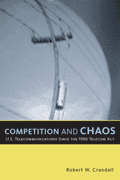The 1996 Telecommunications Act was an attempt to increase competition among telecommunications providers in the United States by reducing regulatory barriers to market entry. This competition was expected to drive innovation in the telecommunications sector and reap economic benefits for both American consumers and telecommunications providers. The legislation, however, had a markedly different impact. While many of the more aggressive providers enjoyed sharp short-term rises in stock market values, they soon faced sudden collapse, leaving consumers with little or no long-term benefit.
In Competition and Chaos, Robert W. Crandall analyzes the impact of the 1996 act on economic welfare in the United States and how the act and its antecedents affected the major telecommunications providers. He argues that the act was far too stringent, inviting the Federal Communications Commission and state regulators to micromanage competitive entry into local telecommunications markets. Combined with the bursting of the dot.com and telecom stock market bubbles, this aggressive policy invited new and existing firms to invest billions of dollars unwisely, leading to the 2001–02 collapse of equity values throughout the sector. New entrants into the market invested more than $50 billion in unproductive assets that were quickly wiped out through massive failures. The 1996 act allowed the independent long-distance companies, such as MCI and AT&T, to live a few years longer. But today they are a threatened species, caught in a downward spiral of declining prices and substantial losses. The industry is preparing for an intense battle for market share among three sets of carriers: the wireless companies, the local telephone carriers, and the cable television businesses. Each has its own particular advantage in one of the three major segments of the market—voice, data, and video—but none is assured a clear path to dominance. Although the telecom stock market collapse is now history and the survivors are investing once again, Crandall concludes that the regulators have failed to adapt to the chaos to which they contributed.
Robert W. Crandall is a senior fellow in the Economic Studies program at the Brookings Institution, where his research has focused on telecommunications and cable television regulation, industrial organization and policy, and the changing regional structure of the U.S. economy. His previous books include Broadband: Should We Regulate Internet Access? (Brookings, 2002), Telecommunications Liberalization on Two Sides of the Atlantic (Brookings, 2001) and Who Pays for Universal Service? (Brookings, 2000).


